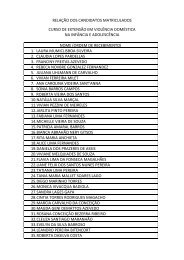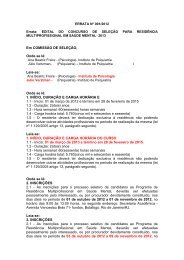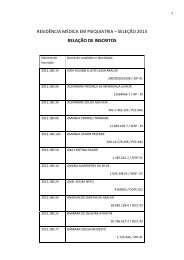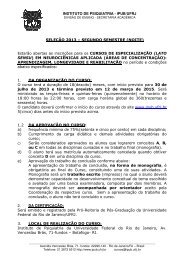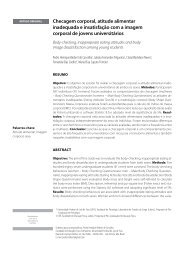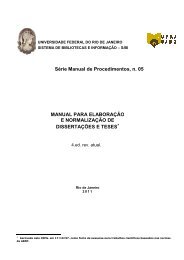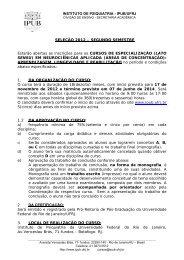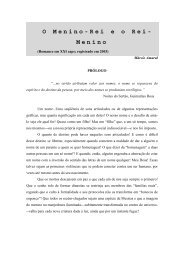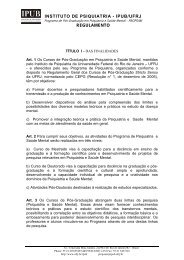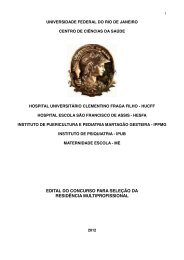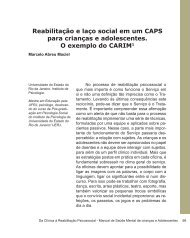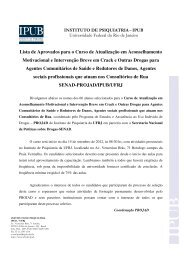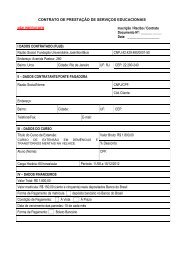Originais â Originals outubro | dezembro ⢠2011 - IPUB - UFRJ
Originais â Originals outubro | dezembro ⢠2011 - IPUB - UFRJ
Originais â Originals outubro | dezembro ⢠2011 - IPUB - UFRJ
You also want an ePaper? Increase the reach of your titles
YUMPU automatically turns print PDFs into web optimized ePapers that Google loves.
ORIGINAL ARTICLE<br />
Eating habits and psychopathology in children and adolescents<br />
243<br />
The minimum acceptable value for the Cronbach’s alpha<br />
coefficient is 0.70; alpha values between 0.80 and 0.90 are<br />
considered ideal 28 .<br />
Second step: applicability of the NBI (annex)<br />
Based on their responses in the Portuguese-language version<br />
of the NBI, the subjects were separated into two groups,<br />
using a cutoff of 30 points 10 . The groups (< 30 and ≥ 30)<br />
were analyzed in relation to the scales for the “Child Behavior<br />
Checklist” (CBCL). This instrument, answered by the children’s<br />
guardians, is used across the world, and has been validated in<br />
Brazil 29 , to measure psychopathological indicators and social<br />
and behavioral problems in subjects between 6 and 18 years<br />
old. The CBCL provides scales concerning overall problems<br />
and two scales of Internalizing and Externalizing problems<br />
of the following kind: depression, withdrawal, rule-breaking<br />
behavior, aggressiveness, social problems, and problems in<br />
thinking, attention, and somatization. In addition, the CBCL<br />
has a subscale based on the diagnostic criteria established<br />
by the Diagnostic and Statistical Manual of Mental Disorders<br />
(DSM), which gives indicators for affective, anxiety and<br />
somatic problems as well as indicators for the diagnosis of<br />
attention deficit/hyperactivity disorder, oppositional defiant<br />
disorder, and conduct problems 29 .<br />
For the scoring, we used software developed by Achenbach<br />
Assessment Data Manager (ADM) 13 , which converts raw<br />
scores into scores that are T-normalized for age and gender.<br />
The 98 th percentile of the normative sample of T scores was 70<br />
or greater and the subclinical (borderline) range for T scores<br />
was 65-70. For total Internalizing and Externalizing Problems,<br />
a T score in the range of 60-63 points is considered borderline<br />
and a T score above 63 points in the clinical range 13 .<br />
Data analyses<br />
For the statistical analyses, Statistica-7.0 (StatiSoft® South<br />
America) software was used. Data were verified in relation<br />
to normality and descriptive analyses using Kolmogorov-<br />
Smirnov tests. The Levene test, one of the strongest and most<br />
robust tests in terms of deviations, was also used to verify<br />
the homogeneity of the variations. In cases where there was<br />
no homogeneity (p < 0.05), Welch’s Student’s T-test (Test W/<br />
Separate Variance Estimates in Statistica) was applied. The<br />
Student T-Test was used to examine relationships between<br />
the dependent variables (IQ, CBCL) and the independent NBI<br />
variable (NBI < 30 or NBI ≥ 30). Comparisons were considered<br />
significant when they had two-tailed values of p < 0.05.<br />
Results<br />
Demographics<br />
The demographic data are summarized in table 1. A total of<br />
96 participants, 9 to 12 years of age, of both sexes (83 boys<br />
and 13 girls), completed the inventory. Average age did not<br />
differ between the groups (p = 0.84). The two groups were<br />
found to be similar with respect to potentially interfering<br />
factors, such as age and IQ. As the children were referred<br />
from the same local public schools, we could presume that<br />
there were not substantial socioeconomic differences in the<br />
groups studied.<br />
Table 1. Demographic data for the study population<br />
Parameter NBI < 30<br />
(N = 28)<br />
Sex<br />
M<br />
(N = 83)<br />
F<br />
(N = 13)<br />
29%<br />
(N = 24)<br />
30.8%<br />
(N = 4)<br />
NBI ≥ 30<br />
(N = 68)<br />
71%<br />
(N = 59)<br />
69.2%<br />
(N = 9)<br />
Age (years) 9.7 ± 1.2 9.8 ± 1.0 0.837<br />
IQ Total (WISC-III) 100.3 ± 20.7 99.3 ± 17.0 0.838<br />
Cultural and sample related adaptations<br />
The cultural adaptation was tested in 20 participants. We<br />
found that after translation and back-translation, some<br />
questions needed to be adapted or withdrawn, as shown<br />
in table 2, to obtain the final version of the adapted<br />
questionnaire. An analysis performed to verify the internal<br />
consistency of the translated instrument yielded a Cronbach’s<br />
alpha index value of 0.8896.<br />
Table 2. Questions on the original NBI inventory that were<br />
changed during adaptation<br />
Original question Translation Adaptation<br />
23. I feel better after<br />
my first snack or meal of<br />
the day<br />
26. I eat sweet things or<br />
drink caffeinated coffee,<br />
tea or cola<br />
31. I drink alcoholic<br />
beverages<br />
36. I constantly worry<br />
about things<br />
23. Eu me sinto melhor<br />
depois do primeiro lanche<br />
ou refeição do dia [I feel<br />
better after my first snack<br />
or meal of the day]<br />
26. Eu como coisas doces<br />
ou bebidas cafeinadas<br />
como café, chá ou Coca-<br />
Cola [I eat sweet things<br />
or caffeinated drinks like<br />
coffee, tea or Coca-Cola]<br />
31. Eu bebo bebidas com<br />
álcool [I drink alcoholic<br />
beverages]<br />
36. Eu constantemente me<br />
preocupo com as coisas<br />
[I constantly worry about<br />
things]<br />
48. I want to kill myself 48. Eu quero me matar<br />
[I want to kill myself]<br />
52. Do you smoke<br />
cigarettes?<br />
52. Você fuma cigarros?<br />
[Do you smoke cigarettes?]<br />
* Questions removed since the study population were underage (9-12 years old).<br />
23. Eu me sinto melhor<br />
depois do café da manhã<br />
[I feel better after<br />
breakfast]<br />
26. Eu como doces ou bebo<br />
Coca-Cola, chá ou café<br />
frequentemente [I often<br />
eat sweets or drink Coca-<br />
Cola, tea or coffee]<br />
Question removed*<br />
35. Eu estou sempre<br />
preocupado com alguma<br />
coisa [I am always worried<br />
about something]<br />
47. Eu já pensei em me<br />
matar [I have thought<br />
about killing myself]<br />
Question removed*<br />
p<br />
J Bras Psiquiatr. <strong>2011</strong>;60(4):240-6.



